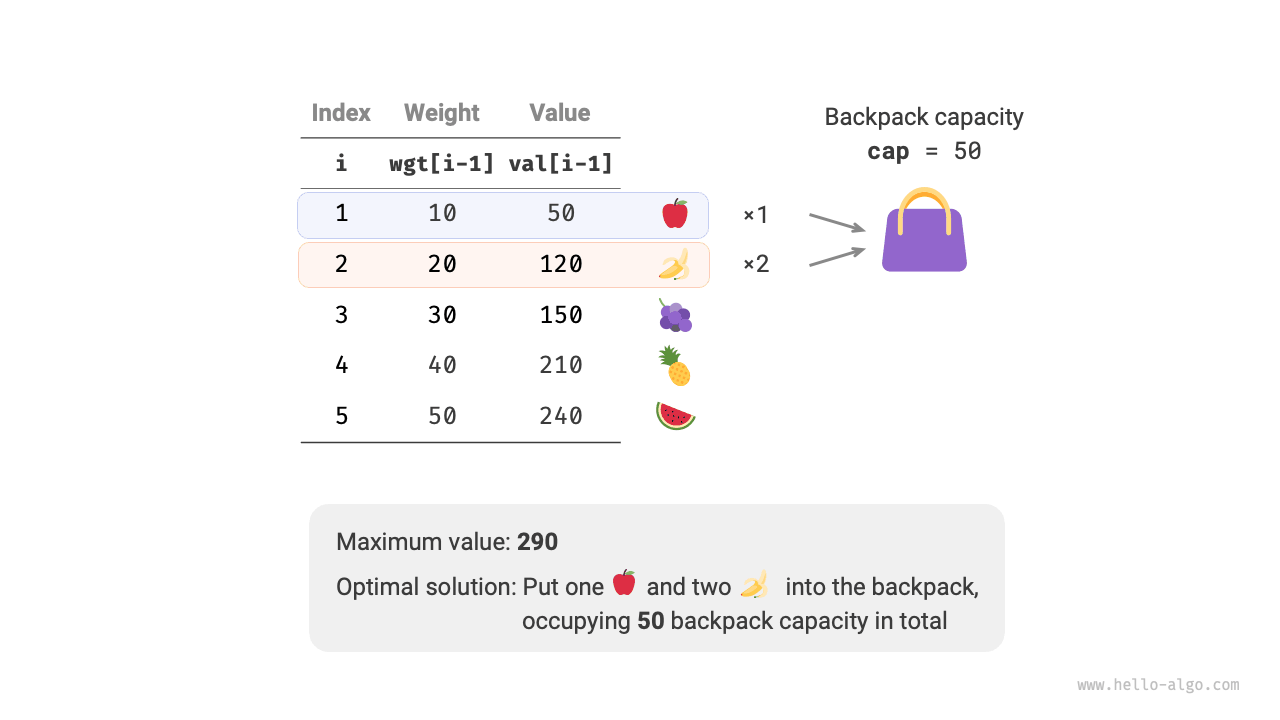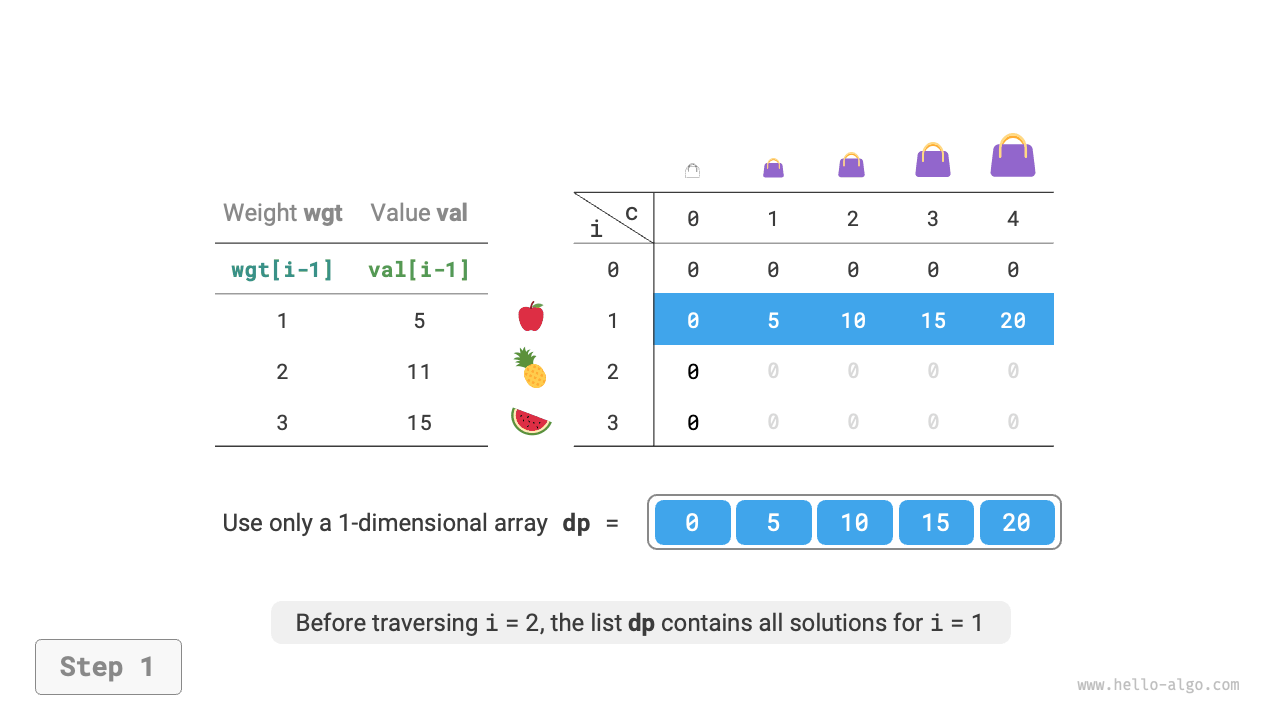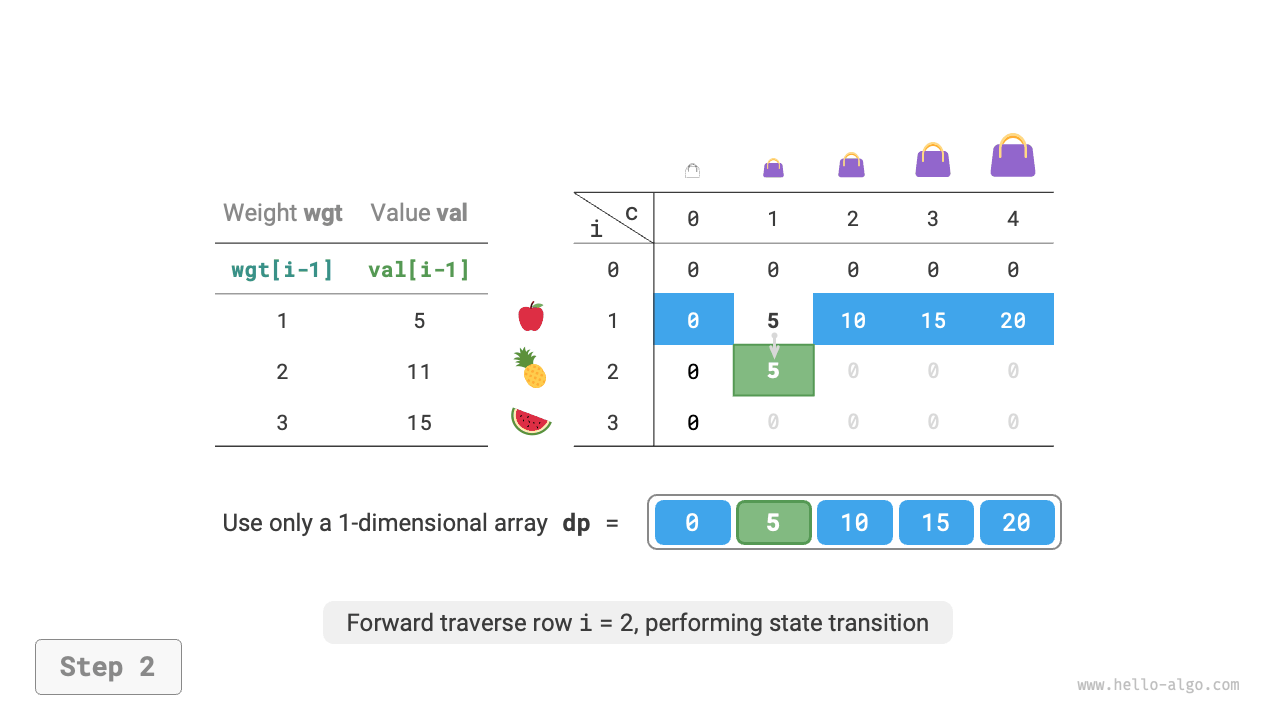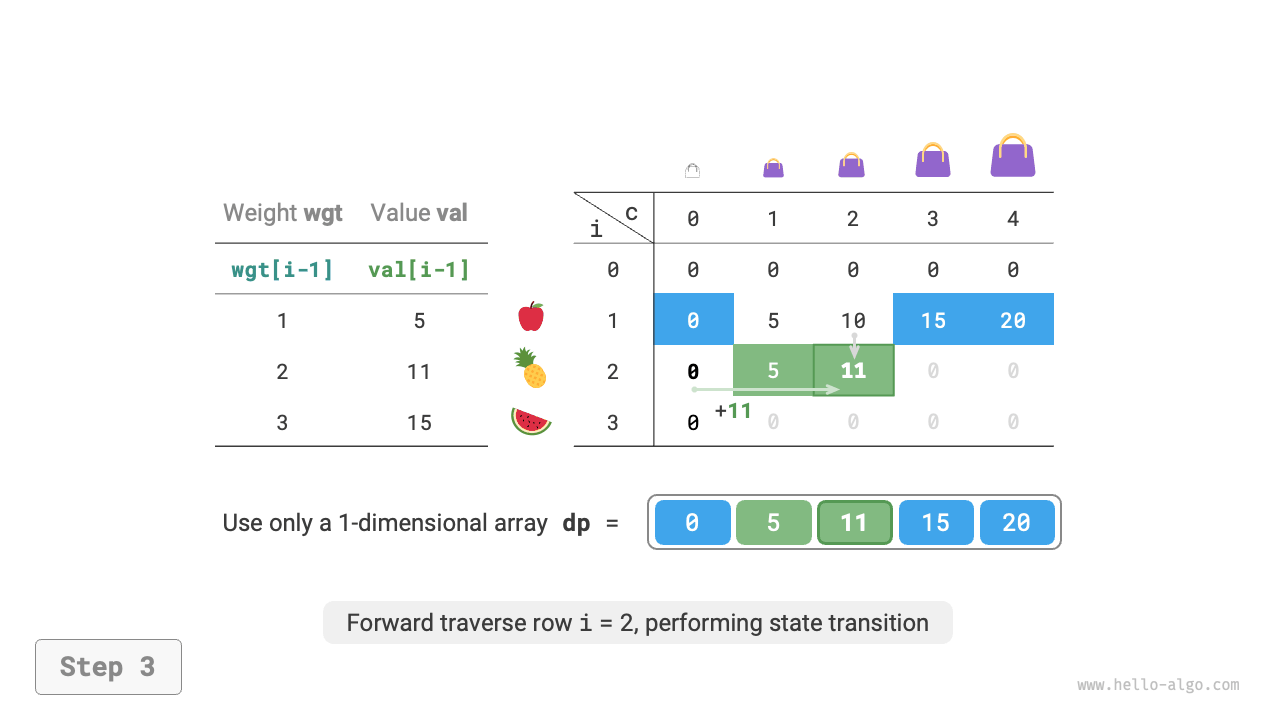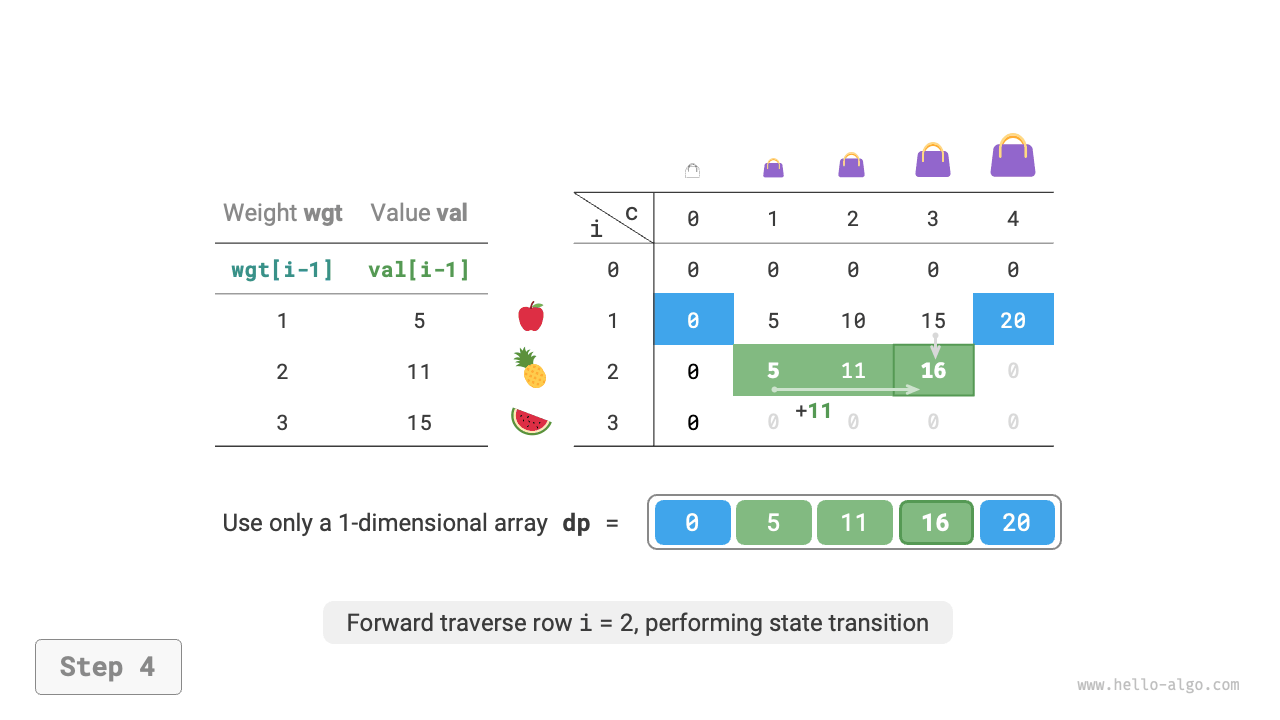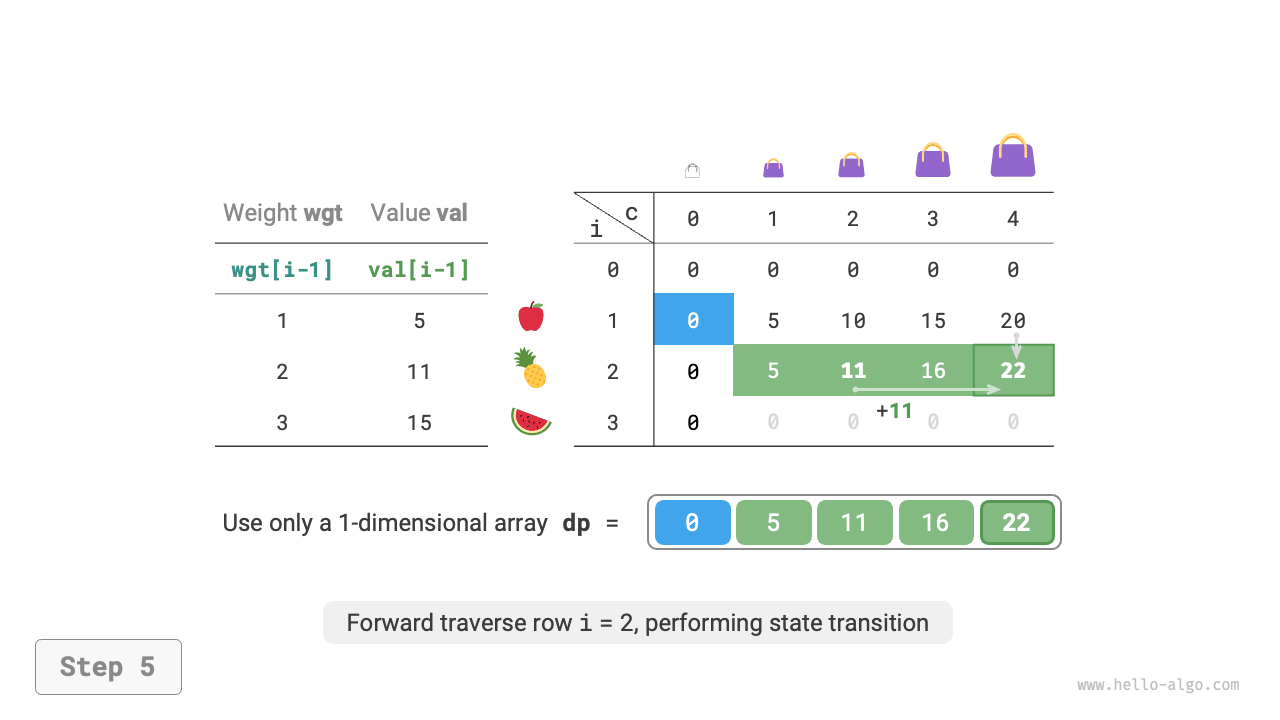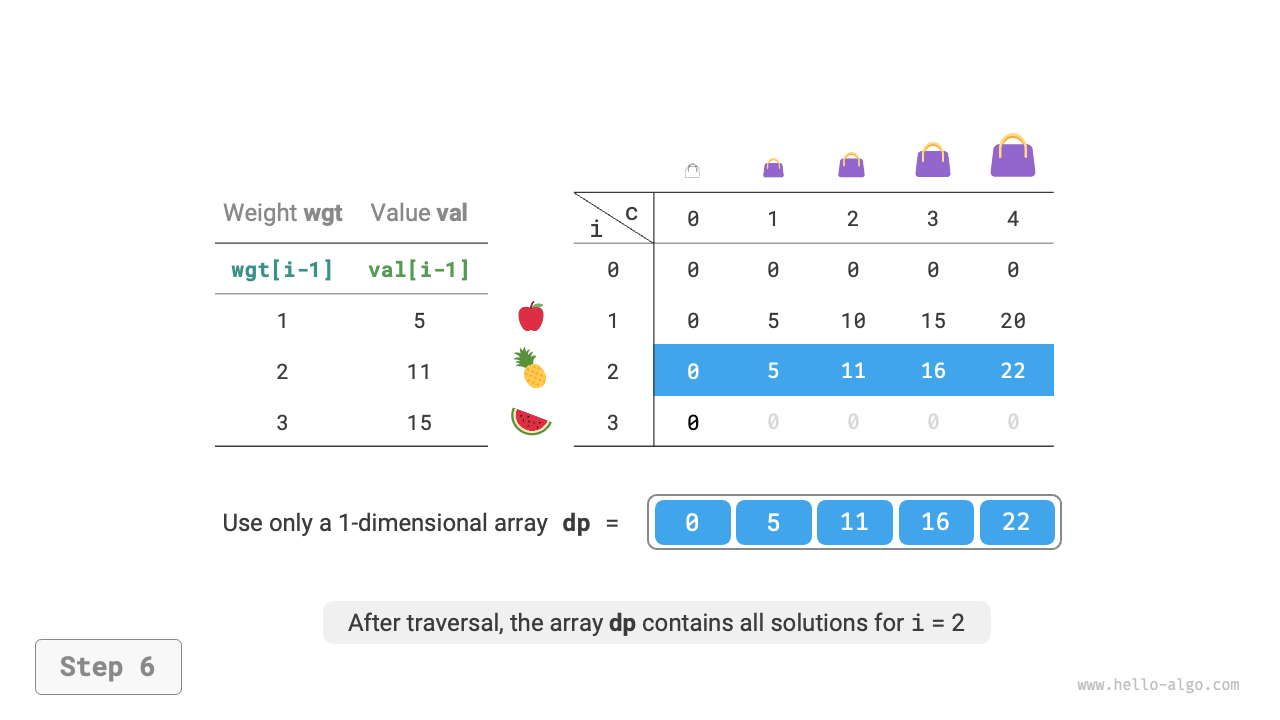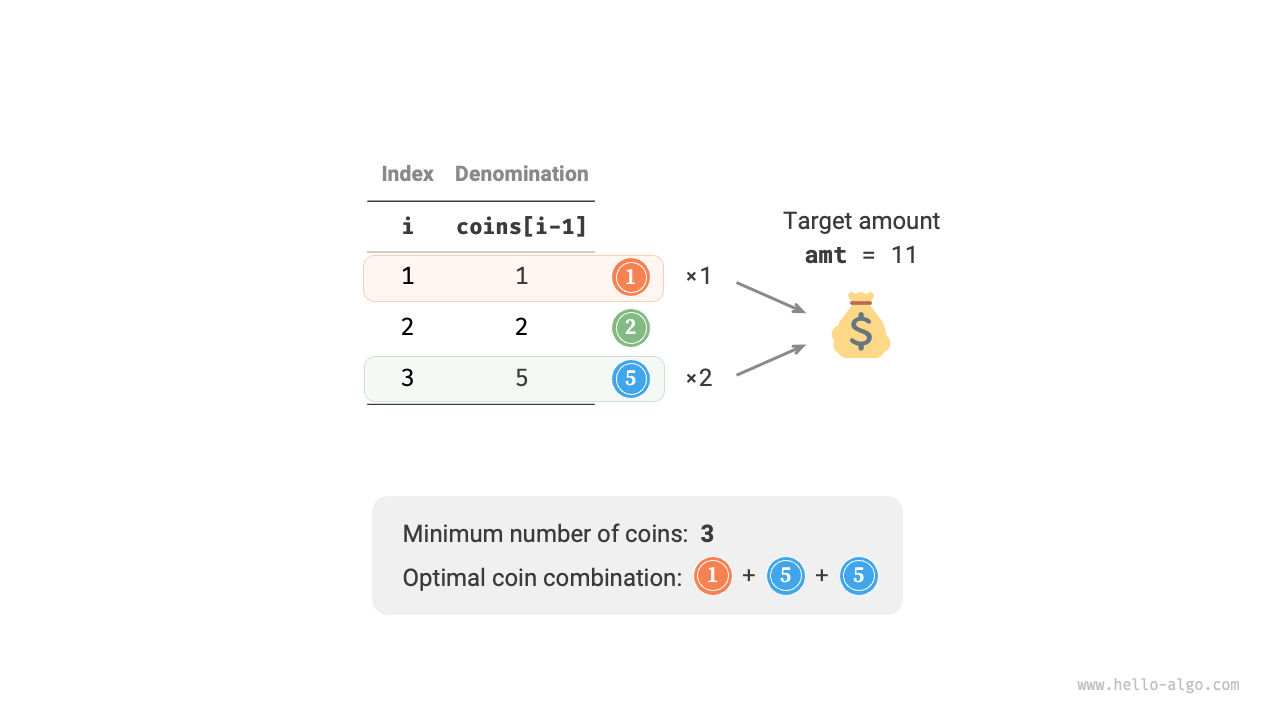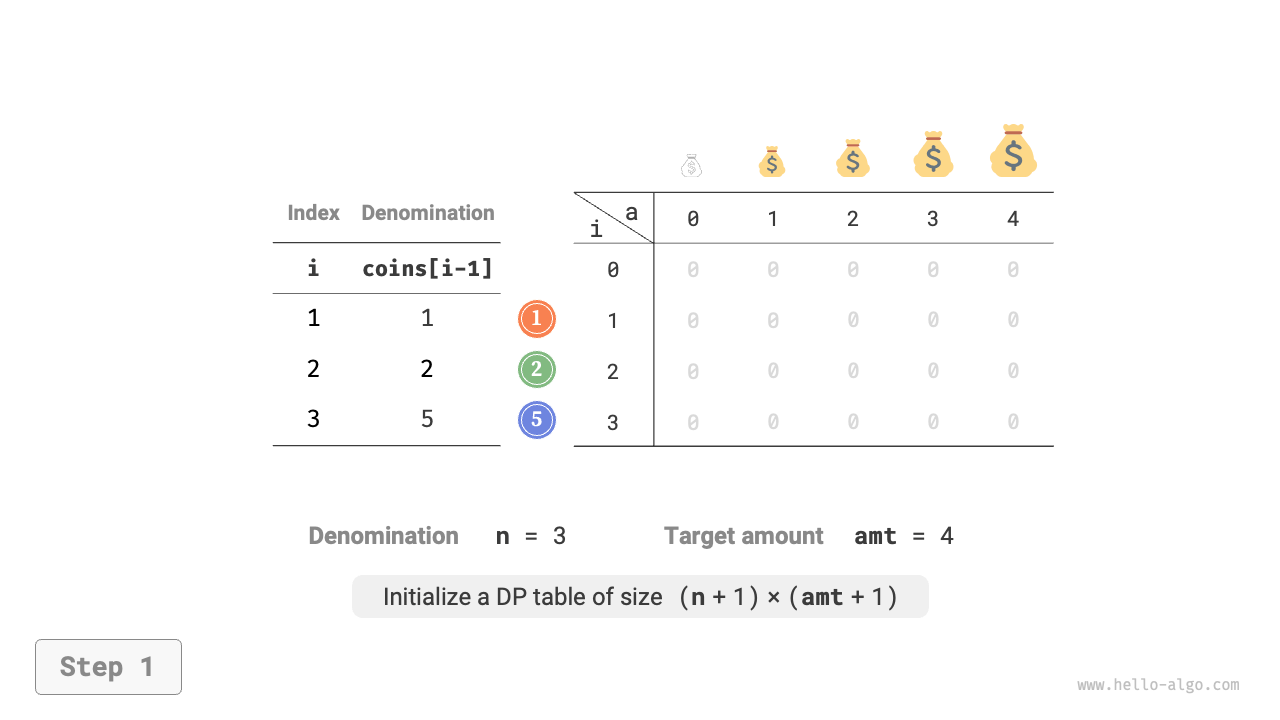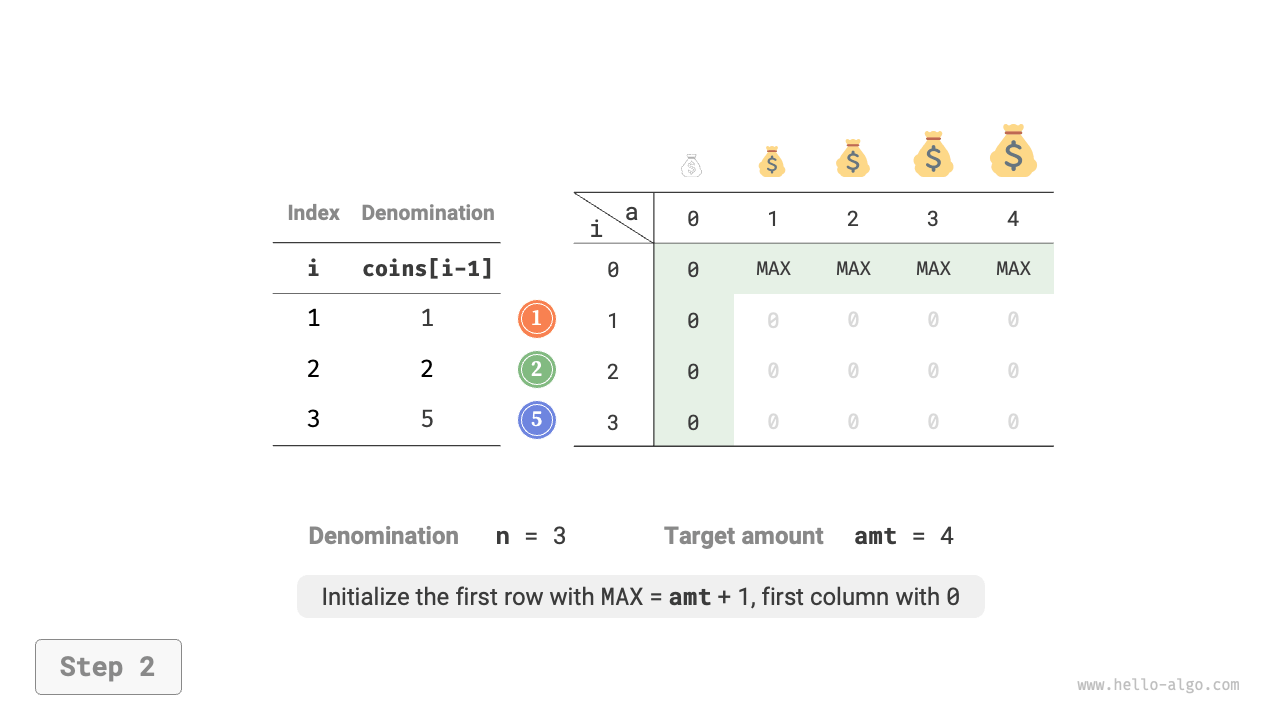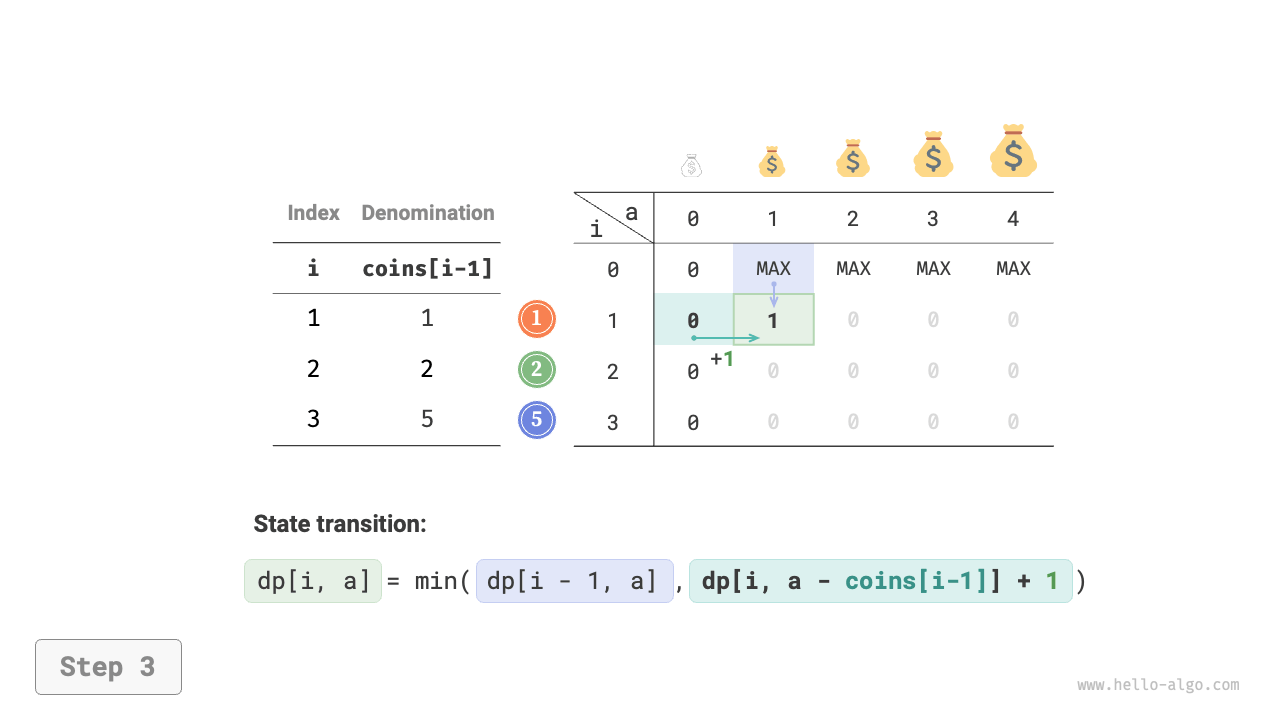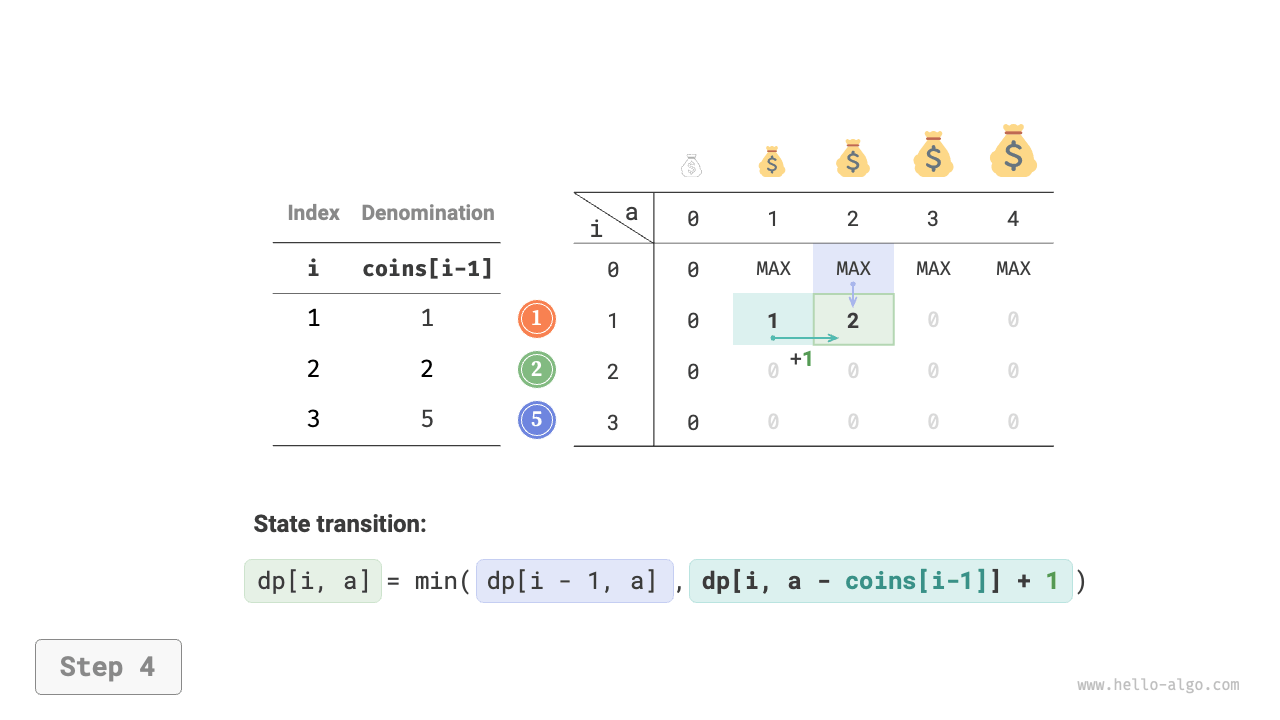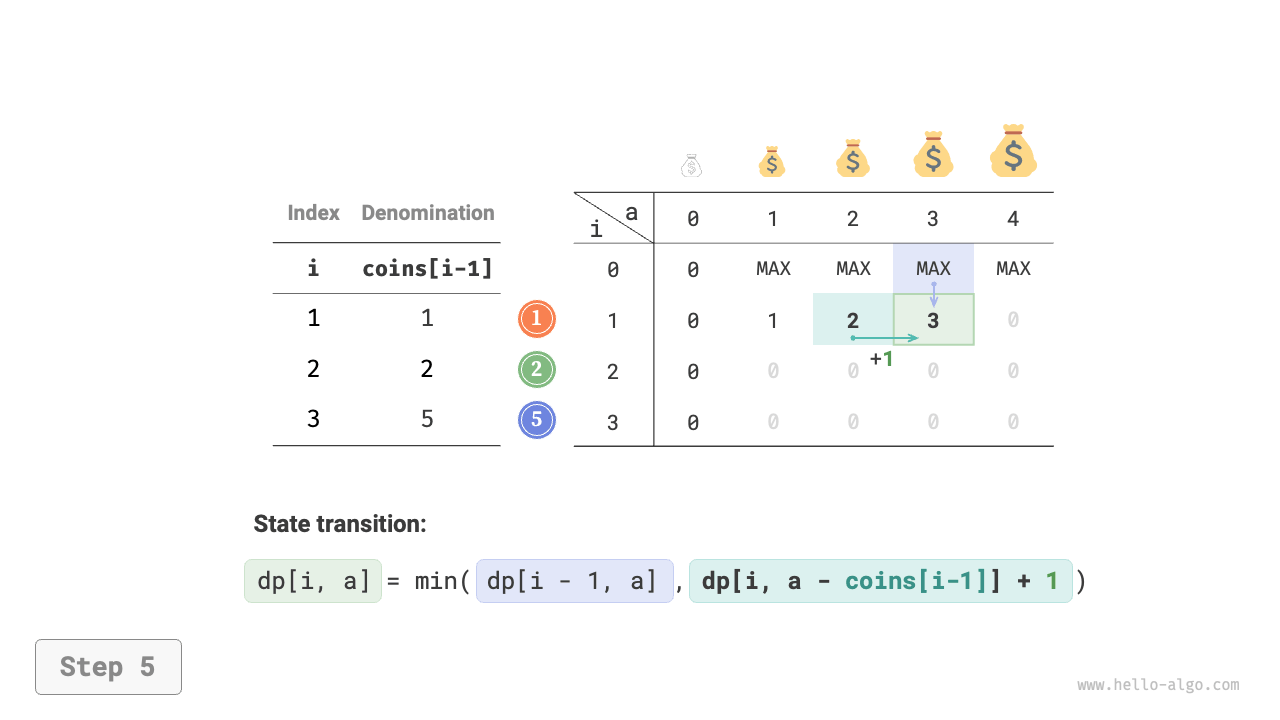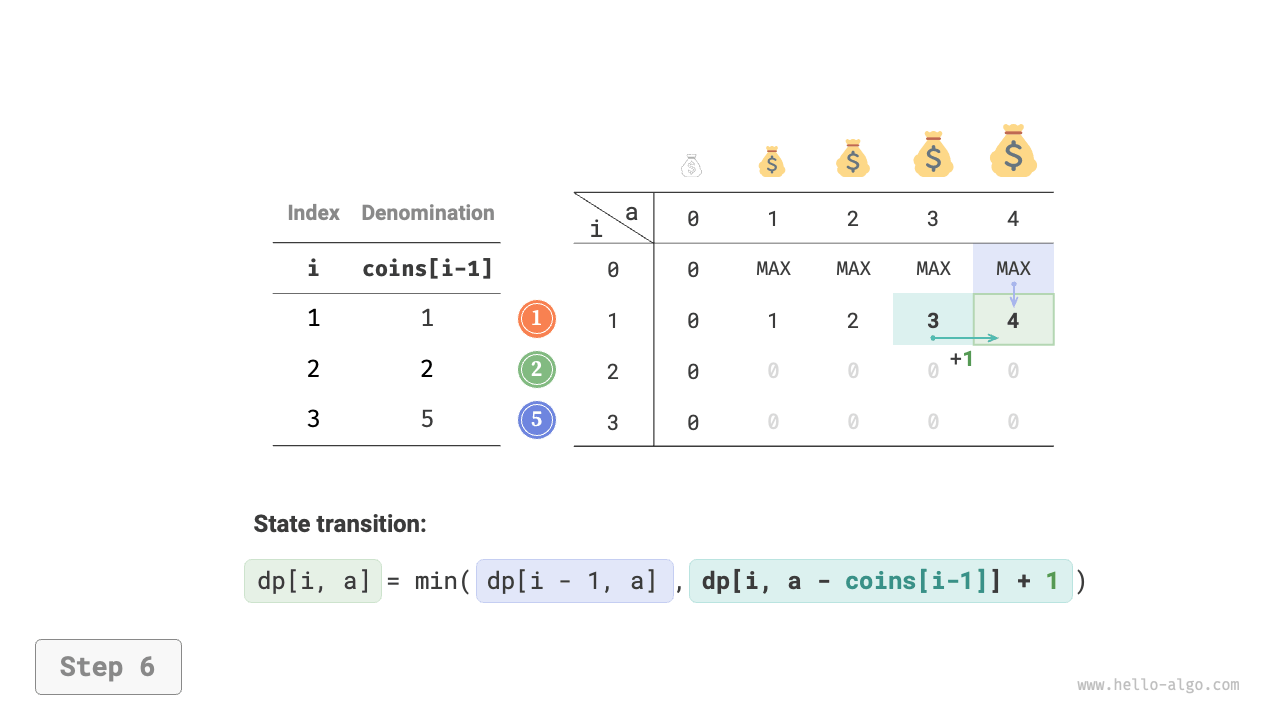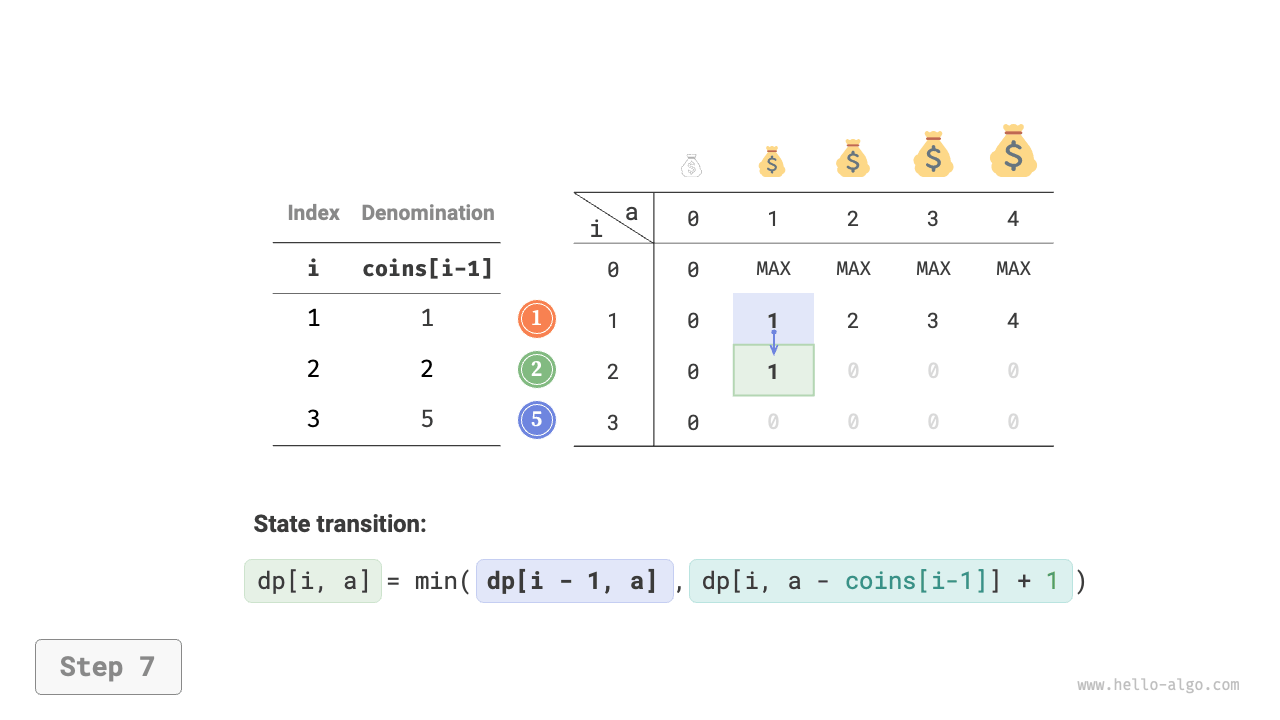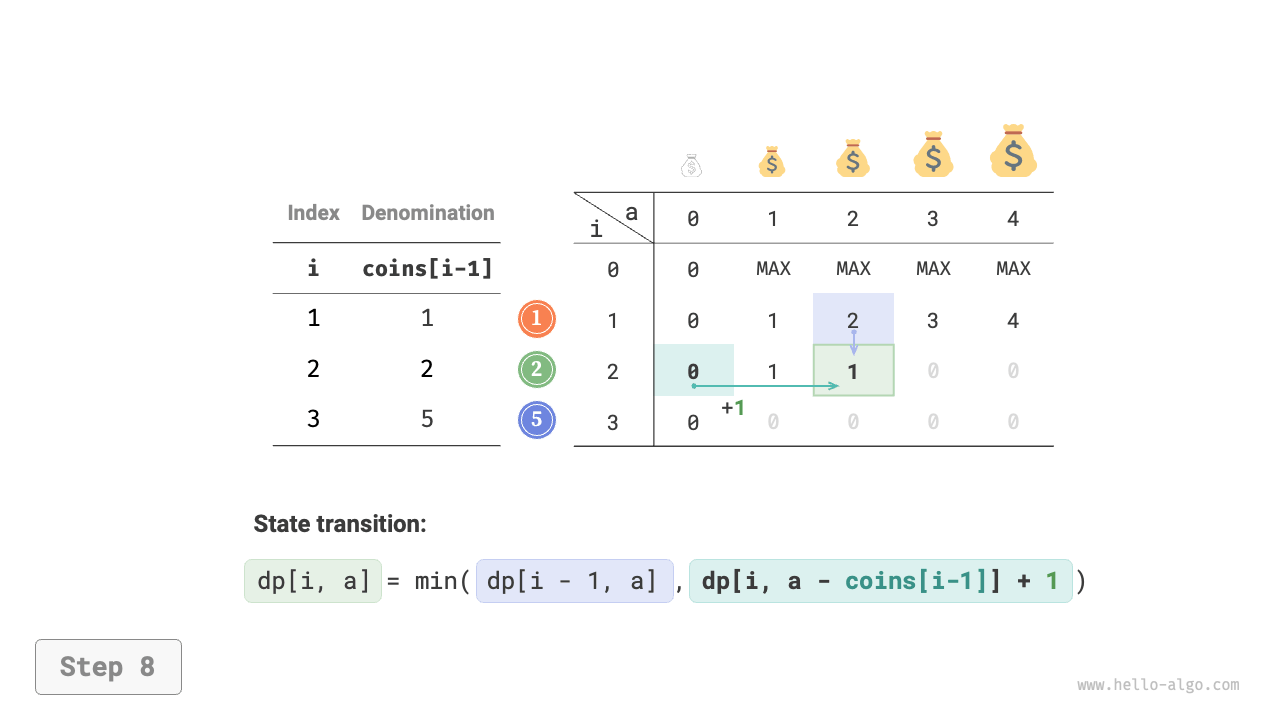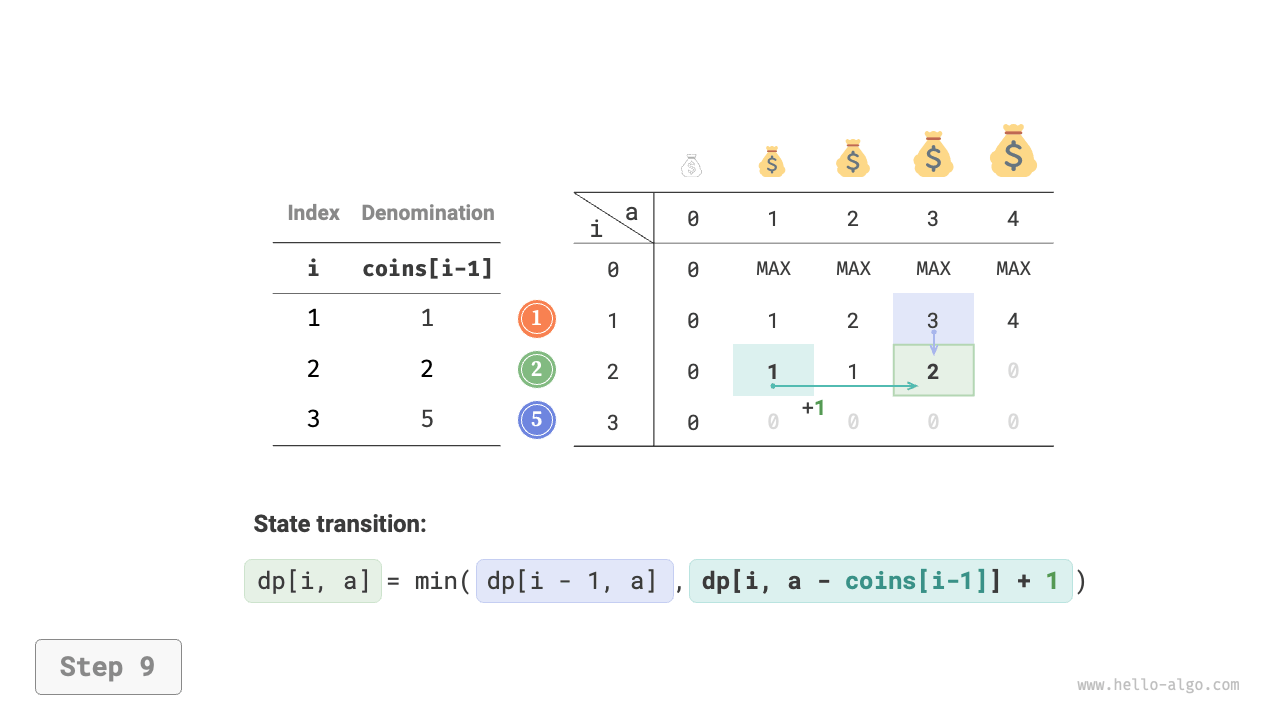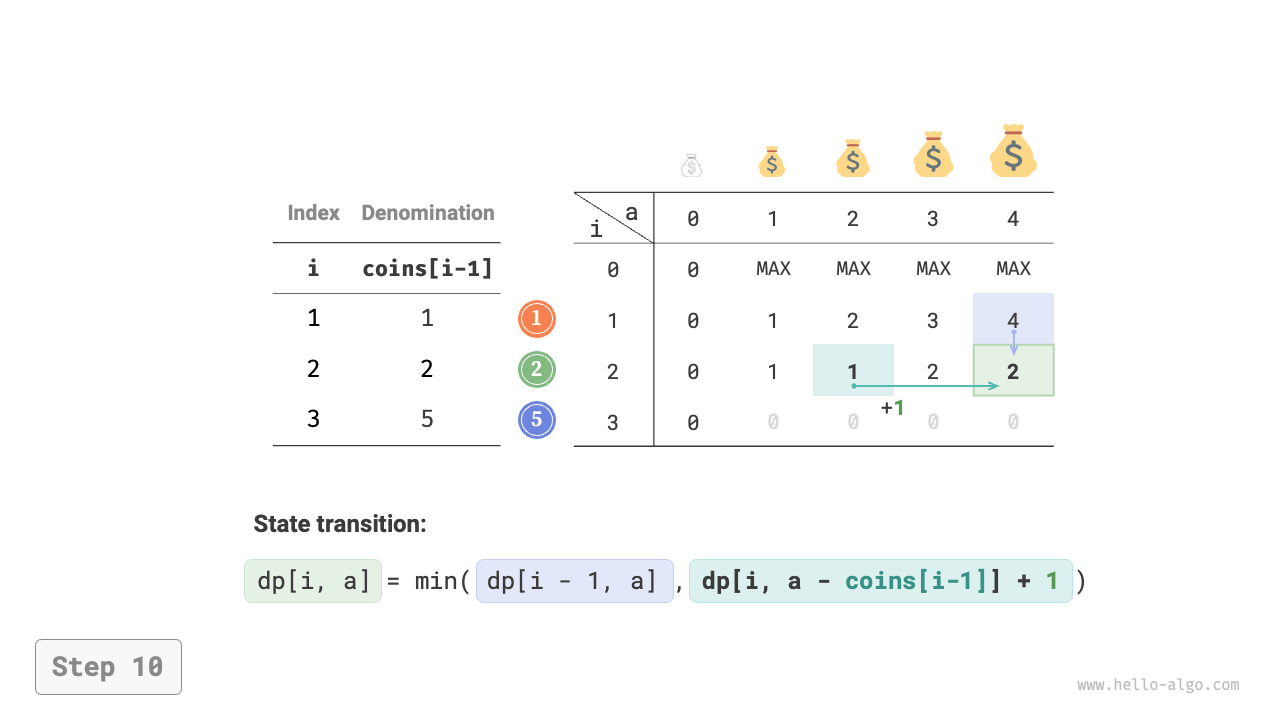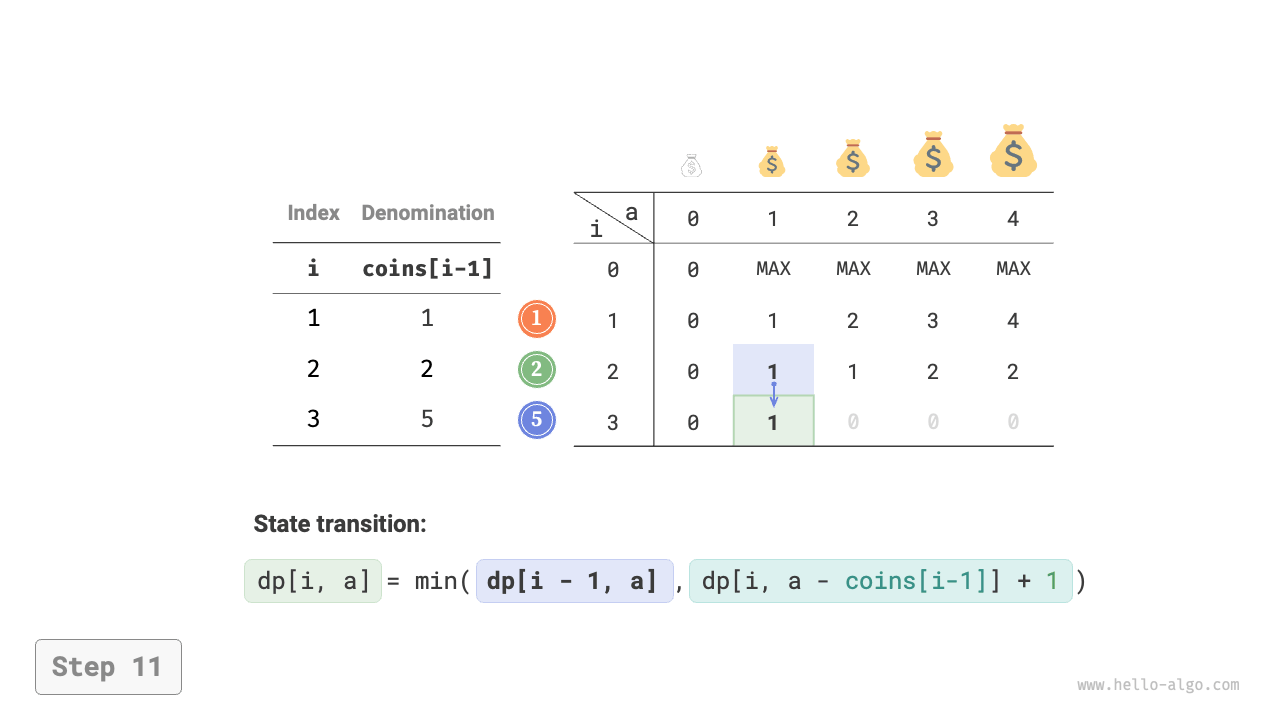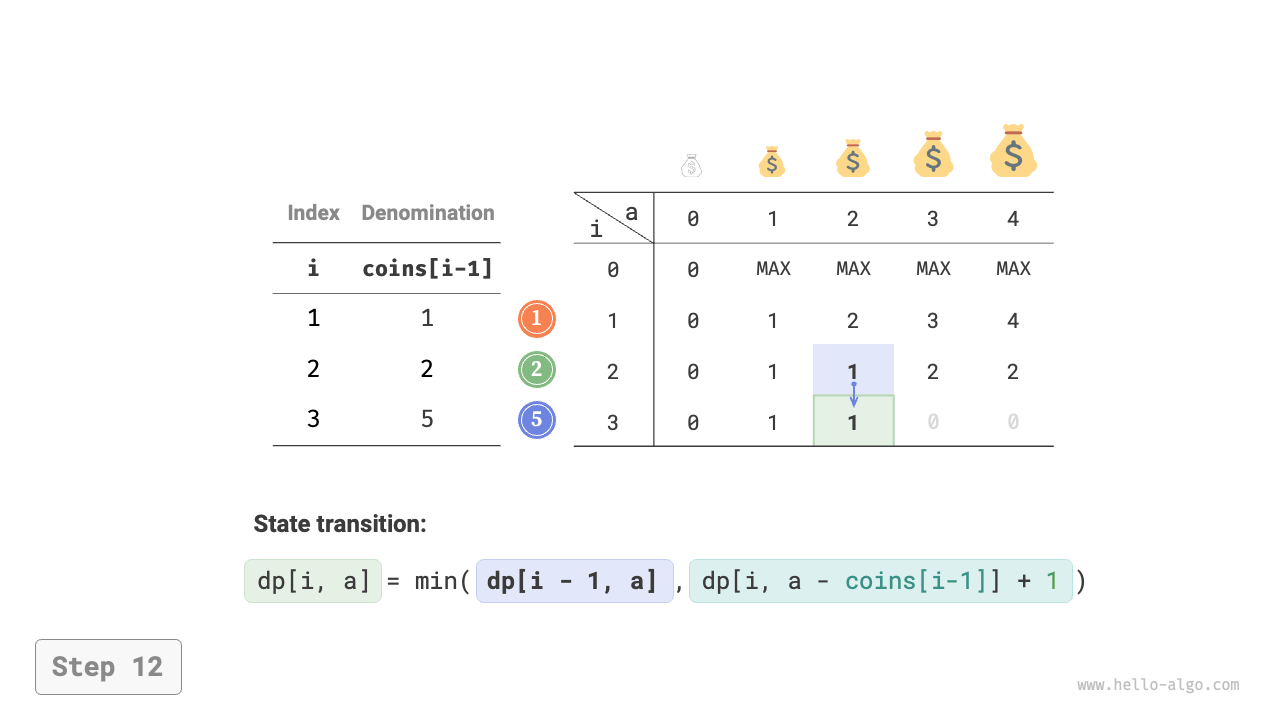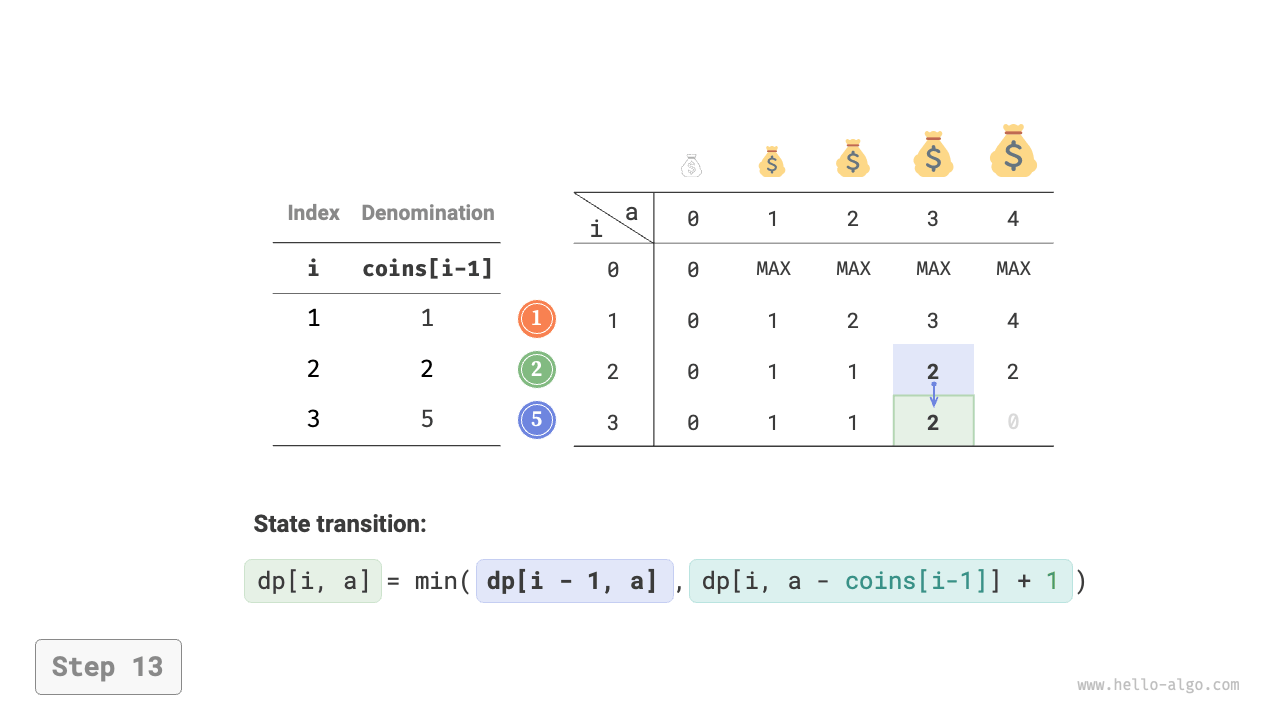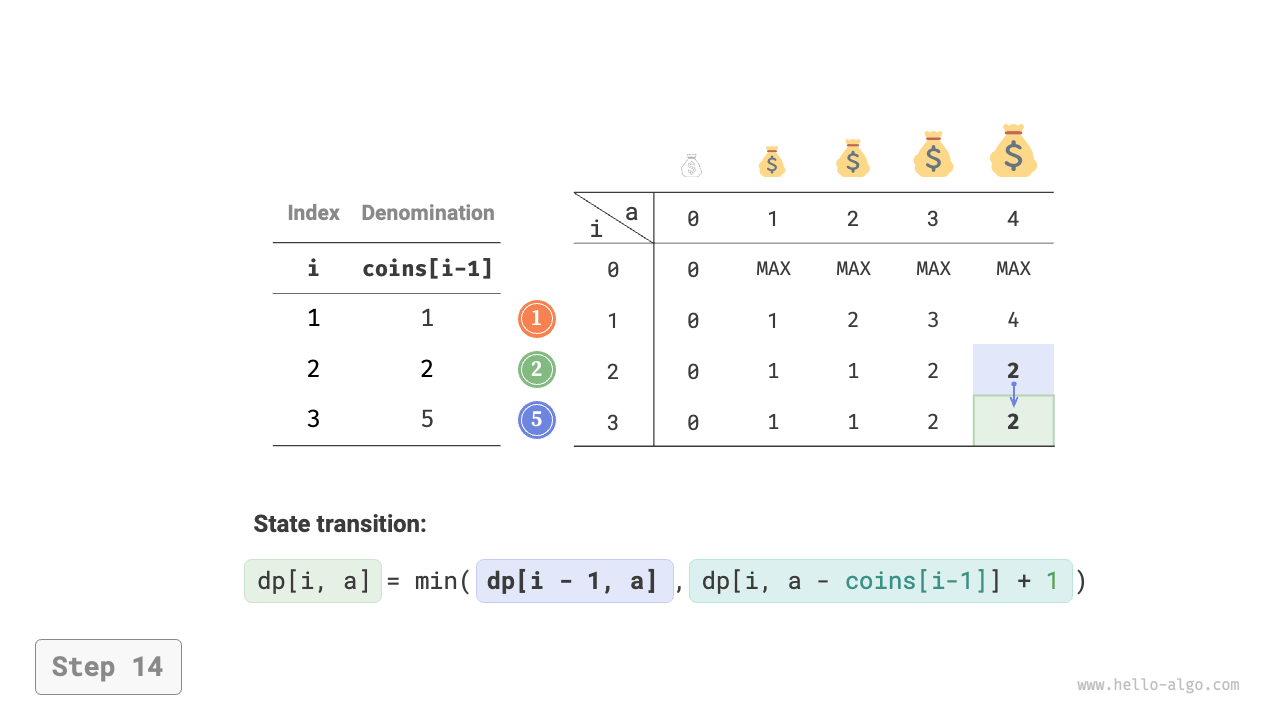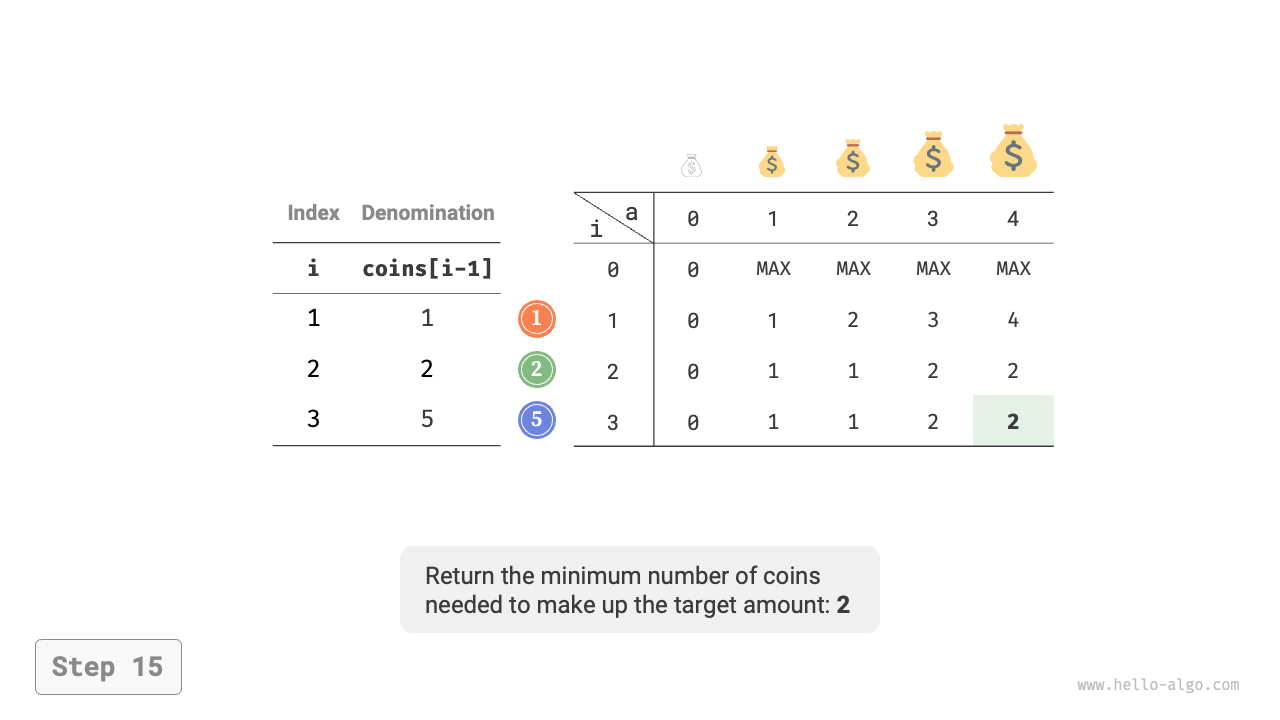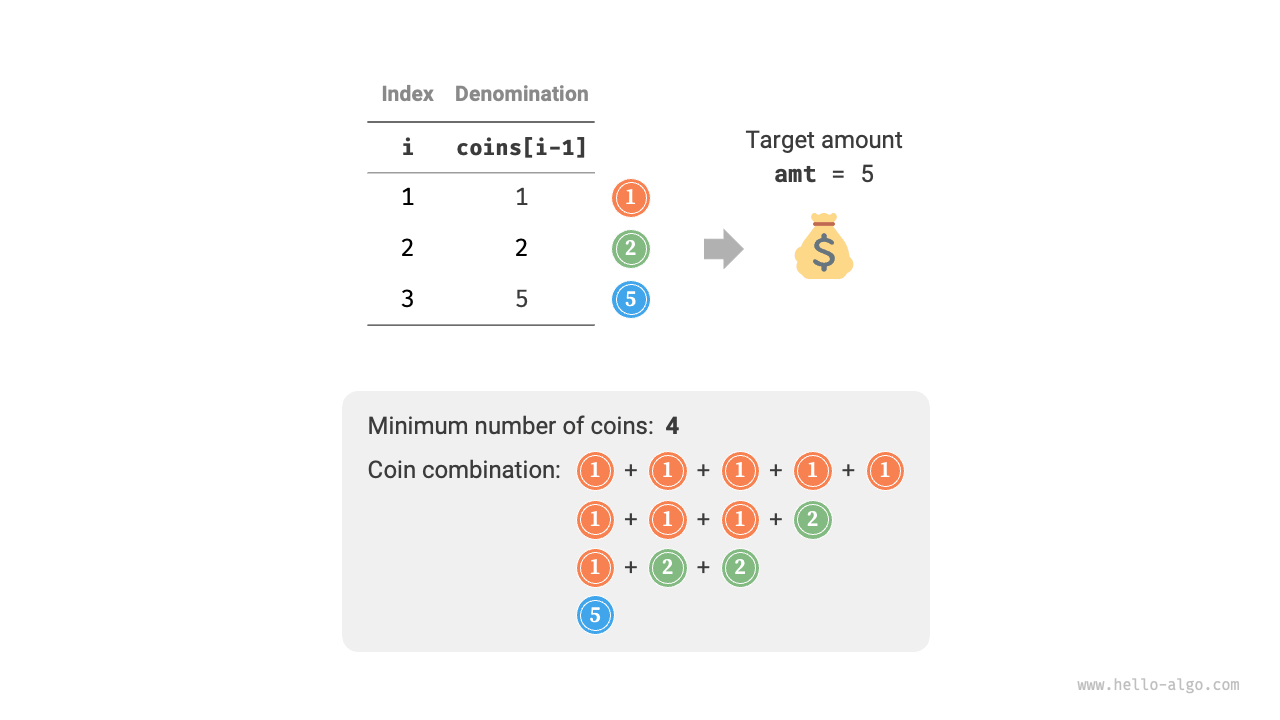14.5 Unbounded knapsack problem¶
In this section, we first solve another common knapsack problem: the unbounded knapsack, and then explore a special case of it: the coin change problem.
14.5.1 Unbounded knapsack problem¶
Question
Given \(n\) items, where the weight of the \(i^{th}\) item is \(wgt[i-1]\) and its value is \(val[i-1]\), and a backpack with a capacity of \(cap\). Each item can be selected multiple times. What is the maximum value of the items that can be put into the backpack without exceeding its capacity? See the example below.
Figure 14-22 Example data for the unbounded knapsack problem
1. Dynamic programming approach¶
The unbounded knapsack problem is very similar to the 0-1 knapsack problem, the only difference being that there is no limit on the number of times an item can be chosen.
- In the 0-1 knapsack problem, there is only one of each item, so after placing item \(i\) into the backpack, you can only choose from the previous \(i-1\) items.
- In the unbounded knapsack problem, the quantity of each item is unlimited, so after placing item \(i\) in the backpack, you can still choose from the previous \(i\) items.
Under the rules of the unbounded knapsack problem, the state \([i, c]\) can change in two ways.
- Not putting item \(i\) in: As with the 0-1 knapsack problem, transition to \([i-1, c]\).
- Putting item \(i\) in: Unlike the 0-1 knapsack problem, transition to \([i, c-wgt[i-1]]\).
The state transition equation thus becomes:
2. Code implementation¶
Comparing the code for the two problems, the state transition changes from \(i-1\) to \(i\), the rest is completely identical:
def unbounded_knapsack_dp(wgt: list[int], val: list[int], cap: int) -> int:
"""Complete knapsack: Dynamic programming"""
n = len(wgt)
# Initialize dp table
dp = [[0] * (cap + 1) for _ in range(n + 1)]
# State transition
for i in range(1, n + 1):
for c in range(1, cap + 1):
if wgt[i - 1] > c:
# If exceeding the knapsack capacity, do not choose item i
dp[i][c] = dp[i - 1][c]
else:
# The greater value between not choosing and choosing item i
dp[i][c] = max(dp[i - 1][c], dp[i][c - wgt[i - 1]] + val[i - 1])
return dp[n][cap]
/* Complete knapsack: Dynamic programming */
int unboundedKnapsackDP(vector<int> &wgt, vector<int> &val, int cap) {
int n = wgt.size();
// Initialize dp table
vector<vector<int>> dp(n + 1, vector<int>(cap + 1, 0));
// State transition
for (int i = 1; i <= n; i++) {
for (int c = 1; c <= cap; c++) {
if (wgt[i - 1] > c) {
// If exceeding the knapsack capacity, do not choose item i
dp[i][c] = dp[i - 1][c];
} else {
// The greater value between not choosing and choosing item i
dp[i][c] = max(dp[i - 1][c], dp[i][c - wgt[i - 1]] + val[i - 1]);
}
}
}
return dp[n][cap];
}
/* Complete knapsack: Dynamic programming */
int unboundedKnapsackDP(int[] wgt, int[] val, int cap) {
int n = wgt.length;
// Initialize dp table
int[][] dp = new int[n + 1][cap + 1];
// State transition
for (int i = 1; i <= n; i++) {
for (int c = 1; c <= cap; c++) {
if (wgt[i - 1] > c) {
// If exceeding the knapsack capacity, do not choose item i
dp[i][c] = dp[i - 1][c];
} else {
// The greater value between not choosing and choosing item i
dp[i][c] = Math.max(dp[i - 1][c], dp[i][c - wgt[i - 1]] + val[i - 1]);
}
}
}
return dp[n][cap];
}
3. Space optimization¶
Since the current state comes from the state to the left and above, the space-optimized solution should perform a forward traversal for each row in the \(dp\) table.
This traversal order is the opposite of that for the 0-1 knapsack. Please refer to Figure 14-23 to understand the difference.
Figure 14-23 Dynamic programming process for the unbounded knapsack problem after space optimization
The code implementation is quite simple, just remove the first dimension of the array dp:
def unbounded_knapsack_dp_comp(wgt: list[int], val: list[int], cap: int) -> int:
"""Complete knapsack: Space-optimized dynamic programming"""
n = len(wgt)
# Initialize dp table
dp = [0] * (cap + 1)
# State transition
for i in range(1, n + 1):
# Traverse in order
for c in range(1, cap + 1):
if wgt[i - 1] > c:
# If exceeding the knapsack capacity, do not choose item i
dp[c] = dp[c]
else:
# The greater value between not choosing and choosing item i
dp[c] = max(dp[c], dp[c - wgt[i - 1]] + val[i - 1])
return dp[cap]
/* Complete knapsack: Space-optimized dynamic programming */
int unboundedKnapsackDPComp(vector<int> &wgt, vector<int> &val, int cap) {
int n = wgt.size();
// Initialize dp table
vector<int> dp(cap + 1, 0);
// State transition
for (int i = 1; i <= n; i++) {
for (int c = 1; c <= cap; c++) {
if (wgt[i - 1] > c) {
// If exceeding the knapsack capacity, do not choose item i
dp[c] = dp[c];
} else {
// The greater value between not choosing and choosing item i
dp[c] = max(dp[c], dp[c - wgt[i - 1]] + val[i - 1]);
}
}
}
return dp[cap];
}
/* Complete knapsack: Space-optimized dynamic programming */
int unboundedKnapsackDPComp(int[] wgt, int[] val, int cap) {
int n = wgt.length;
// Initialize dp table
int[] dp = new int[cap + 1];
// State transition
for (int i = 1; i <= n; i++) {
for (int c = 1; c <= cap; c++) {
if (wgt[i - 1] > c) {
// If exceeding the knapsack capacity, do not choose item i
dp[c] = dp[c];
} else {
// The greater value between not choosing and choosing item i
dp[c] = Math.max(dp[c], dp[c - wgt[i - 1]] + val[i - 1]);
}
}
}
return dp[cap];
}
14.5.2 Coin change problem¶
The knapsack problem is a representative of a large class of dynamic programming problems and has many variants, such as the coin change problem.
Question
Given \(n\) types of coins, the denomination of the \(i^{th}\) type of coin is \(coins[i - 1]\), and the target amount is \(amt\). Each type of coin can be selected multiple times. What is the minimum number of coins needed to make up the target amount? If it is impossible to make up the target amount, return \(-1\). See the example below.
Figure 14-24 Example data for the coin change problem
1. Dynamic programming approach¶
The coin change can be seen as a special case of the unbounded knapsack problem, sharing the following similarities and differences.
- The two problems can be converted into each other: "item" corresponds to "coin", "item weight" corresponds to "coin denomination", and "backpack capacity" corresponds to "target amount".
- The optimization goals are opposite: the unbounded knapsack problem aims to maximize the value of items, while the coin change problem aims to minimize the number of coins.
- The unbounded knapsack problem seeks solutions "not exceeding" the backpack capacity, while the coin change seeks solutions that "exactly" make up the target amount.
First step: Think through each round's decision-making, define the state, and thus derive the \(dp\) table
The state \([i, a]\) corresponds to the sub-problem: the minimum number of coins that can make up the amount \(a\) using the first \(i\) types of coins, denoted as \(dp[i, a]\).
The two-dimensional \(dp\) table is of size \((n+1) \times (amt+1)\).
Second step: Identify the optimal substructure and derive the state transition equation
This problem differs from the unbounded knapsack problem in two aspects of the state transition equation.
- This problem seeks the minimum, so the operator \(\max()\) needs to be changed to \(\min()\).
- The optimization is focused on the number of coins, so simply add \(+1\) when a coin is chosen.
Third step: Define boundary conditions and state transition order
When the target amount is \(0\), the minimum number of coins needed to make it up is \(0\), so all \(dp[i, 0]\) in the first column are \(0\).
When there are no coins, it is impossible to make up any amount >0, which is an invalid solution. To allow the \(\min()\) function in the state transition equation to recognize and filter out invalid solutions, consider using \(+\infty\) to represent them, i.e., set all \(dp[0, a]\) in the first row to \(+\infty\).
2. Code implementation¶
Most programming languages do not provide a \(+\infty\) variable, only the maximum value of an integer int can be used as a substitute. This can lead to overflow: the \(+1\) operation in the state transition equation may overflow.
For this reason, we use the number \(amt + 1\) to represent an invalid solution, because the maximum number of coins needed to make up \(amt\) is at most \(amt\). Before returning the result, check if \(dp[n, amt]\) equals \(amt + 1\), and if so, return \(-1\), indicating that the target amount cannot be made up. The code is as follows:
def coin_change_dp(coins: list[int], amt: int) -> int:
"""Coin change: Dynamic programming"""
n = len(coins)
MAX = amt + 1
# Initialize dp table
dp = [[0] * (amt + 1) for _ in range(n + 1)]
# State transition: first row and first column
for a in range(1, amt + 1):
dp[0][a] = MAX
# State transition: the rest of the rows and columns
for i in range(1, n + 1):
for a in range(1, amt + 1):
if coins[i - 1] > a:
# If exceeding the target amount, do not choose coin i
dp[i][a] = dp[i - 1][a]
else:
# The smaller value between not choosing and choosing coin i
dp[i][a] = min(dp[i - 1][a], dp[i][a - coins[i - 1]] + 1)
return dp[n][amt] if dp[n][amt] != MAX else -1
/* Coin change: Dynamic programming */
int coinChangeDP(vector<int> &coins, int amt) {
int n = coins.size();
int MAX = amt + 1;
// Initialize dp table
vector<vector<int>> dp(n + 1, vector<int>(amt + 1, 0));
// State transition: first row and first column
for (int a = 1; a <= amt; a++) {
dp[0][a] = MAX;
}
// State transition: the rest of the rows and columns
for (int i = 1; i <= n; i++) {
for (int a = 1; a <= amt; a++) {
if (coins[i - 1] > a) {
// If exceeding the target amount, do not choose coin i
dp[i][a] = dp[i - 1][a];
} else {
// The smaller value between not choosing and choosing coin i
dp[i][a] = min(dp[i - 1][a], dp[i][a - coins[i - 1]] + 1);
}
}
}
return dp[n][amt] != MAX ? dp[n][amt] : -1;
}
/* Coin change: Dynamic programming */
int coinChangeDP(int[] coins, int amt) {
int n = coins.length;
int MAX = amt + 1;
// Initialize dp table
int[][] dp = new int[n + 1][amt + 1];
// State transition: first row and first column
for (int a = 1; a <= amt; a++) {
dp[0][a] = MAX;
}
// State transition: the rest of the rows and columns
for (int i = 1; i <= n; i++) {
for (int a = 1; a <= amt; a++) {
if (coins[i - 1] > a) {
// If exceeding the target amount, do not choose coin i
dp[i][a] = dp[i - 1][a];
} else {
// The smaller value between not choosing and choosing coin i
dp[i][a] = Math.min(dp[i - 1][a], dp[i][a - coins[i - 1]] + 1);
}
}
}
return dp[n][amt] != MAX ? dp[n][amt] : -1;
}
Figure 14-25 show the dynamic programming process for the coin change problem, which is very similar to the unbounded knapsack problem.
Figure 14-25 Dynamic programming process for the coin change problem
3. Space optimization¶
The space optimization for the coin change problem is handled in the same way as for the unbounded knapsack problem:
def coin_change_dp_comp(coins: list[int], amt: int) -> int:
"""Coin change: Space-optimized dynamic programming"""
n = len(coins)
MAX = amt + 1
# Initialize dp table
dp = [MAX] * (amt + 1)
dp[0] = 0
# State transition
for i in range(1, n + 1):
# Traverse in order
for a in range(1, amt + 1):
if coins[i - 1] > a:
# If exceeding the target amount, do not choose coin i
dp[a] = dp[a]
else:
# The smaller value between not choosing and choosing coin i
dp[a] = min(dp[a], dp[a - coins[i - 1]] + 1)
return dp[amt] if dp[amt] != MAX else -1
/* Coin change: Space-optimized dynamic programming */
int coinChangeDPComp(vector<int> &coins, int amt) {
int n = coins.size();
int MAX = amt + 1;
// Initialize dp table
vector<int> dp(amt + 1, MAX);
dp[0] = 0;
// State transition
for (int i = 1; i <= n; i++) {
for (int a = 1; a <= amt; a++) {
if (coins[i - 1] > a) {
// If exceeding the target amount, do not choose coin i
dp[a] = dp[a];
} else {
// The smaller value between not choosing and choosing coin i
dp[a] = min(dp[a], dp[a - coins[i - 1]] + 1);
}
}
}
return dp[amt] != MAX ? dp[amt] : -1;
}
/* Coin change: Space-optimized dynamic programming */
int coinChangeDPComp(int[] coins, int amt) {
int n = coins.length;
int MAX = amt + 1;
// Initialize dp table
int[] dp = new int[amt + 1];
Arrays.fill(dp, MAX);
dp[0] = 0;
// State transition
for (int i = 1; i <= n; i++) {
for (int a = 1; a <= amt; a++) {
if (coins[i - 1] > a) {
// If exceeding the target amount, do not choose coin i
dp[a] = dp[a];
} else {
// The smaller value between not choosing and choosing coin i
dp[a] = Math.min(dp[a], dp[a - coins[i - 1]] + 1);
}
}
}
return dp[amt] != MAX ? dp[amt] : -1;
}
14.5.3 Coin change problem II¶
Question
Given \(n\) types of coins, where the denomination of the \(i^{th}\) type of coin is \(coins[i - 1]\), and the target amount is \(amt\). Each type of coin can be selected multiple times, ask how many combinations of coins can make up the target amount. See the example below.
Figure 14-26 Example data for Coin Change Problem II
1. Dynamic programming approach¶
Compared to the previous problem, the goal of this problem is to determine the number of combinations, so the sub-problem becomes: the number of combinations that can make up amount \(a\) using the first \(i\) types of coins. The \(dp\) table remains a two-dimensional matrix of size \((n+1) \times (amt + 1)\).
The number of combinations for the current state is the sum of the combinations from not selecting the current coin and selecting the current coin. The state transition equation is:
When the target amount is \(0\), no coins are needed to make up the target amount, so all \(dp[i, 0]\) in the first column should be initialized to \(1\). When there are no coins, it is impossible to make up any amount >0, so all \(dp[0, a]\) in the first row should be set to \(0\).
2. Code implementation¶
def coin_change_ii_dp(coins: list[int], amt: int) -> int:
"""Coin change II: Dynamic programming"""
n = len(coins)
# Initialize dp table
dp = [[0] * (amt + 1) for _ in range(n + 1)]
# Initialize first column
for i in range(n + 1):
dp[i][0] = 1
# State transition
for i in range(1, n + 1):
for a in range(1, amt + 1):
if coins[i - 1] > a:
# If exceeding the target amount, do not choose coin i
dp[i][a] = dp[i - 1][a]
else:
# The sum of the two options of not choosing and choosing coin i
dp[i][a] = dp[i - 1][a] + dp[i][a - coins[i - 1]]
return dp[n][amt]
/* Coin change II: Dynamic programming */
int coinChangeIIDP(vector<int> &coins, int amt) {
int n = coins.size();
// Initialize dp table
vector<vector<int>> dp(n + 1, vector<int>(amt + 1, 0));
// Initialize first column
for (int i = 0; i <= n; i++) {
dp[i][0] = 1;
}
// State transition
for (int i = 1; i <= n; i++) {
for (int a = 1; a <= amt; a++) {
if (coins[i - 1] > a) {
// If exceeding the target amount, do not choose coin i
dp[i][a] = dp[i - 1][a];
} else {
// The sum of the two options of not choosing and choosing coin i
dp[i][a] = dp[i - 1][a] + dp[i][a - coins[i - 1]];
}
}
}
return dp[n][amt];
}
/* Coin change II: Dynamic programming */
int coinChangeIIDP(int[] coins, int amt) {
int n = coins.length;
// Initialize dp table
int[][] dp = new int[n + 1][amt + 1];
// Initialize first column
for (int i = 0; i <= n; i++) {
dp[i][0] = 1;
}
// State transition
for (int i = 1; i <= n; i++) {
for (int a = 1; a <= amt; a++) {
if (coins[i - 1] > a) {
// If exceeding the target amount, do not choose coin i
dp[i][a] = dp[i - 1][a];
} else {
// The sum of the two options of not choosing and choosing coin i
dp[i][a] = dp[i - 1][a] + dp[i][a - coins[i - 1]];
}
}
}
return dp[n][amt];
}
3. Space optimization¶
The space optimization approach is the same, just remove the coin dimension:
def coin_change_ii_dp_comp(coins: list[int], amt: int) -> int:
"""Coin change II: Space-optimized dynamic programming"""
n = len(coins)
# Initialize dp table
dp = [0] * (amt + 1)
dp[0] = 1
# State transition
for i in range(1, n + 1):
# Traverse in order
for a in range(1, amt + 1):
if coins[i - 1] > a:
# If exceeding the target amount, do not choose coin i
dp[a] = dp[a]
else:
# The sum of the two options of not choosing and choosing coin i
dp[a] = dp[a] + dp[a - coins[i - 1]]
return dp[amt]
/* Coin change II: Space-optimized dynamic programming */
int coinChangeIIDPComp(vector<int> &coins, int amt) {
int n = coins.size();
// Initialize dp table
vector<int> dp(amt + 1, 0);
dp[0] = 1;
// State transition
for (int i = 1; i <= n; i++) {
for (int a = 1; a <= amt; a++) {
if (coins[i - 1] > a) {
// If exceeding the target amount, do not choose coin i
dp[a] = dp[a];
} else {
// The sum of the two options of not choosing and choosing coin i
dp[a] = dp[a] + dp[a - coins[i - 1]];
}
}
}
return dp[amt];
}
/* Coin change II: Space-optimized dynamic programming */
int coinChangeIIDPComp(int[] coins, int amt) {
int n = coins.length;
// Initialize dp table
int[] dp = new int[amt + 1];
dp[0] = 1;
// State transition
for (int i = 1; i <= n; i++) {
for (int a = 1; a <= amt; a++) {
if (coins[i - 1] > a) {
// If exceeding the target amount, do not choose coin i
dp[a] = dp[a];
} else {
// The sum of the two options of not choosing and choosing coin i
dp[a] = dp[a] + dp[a - coins[i - 1]];
}
}
}
return dp[amt];
}
